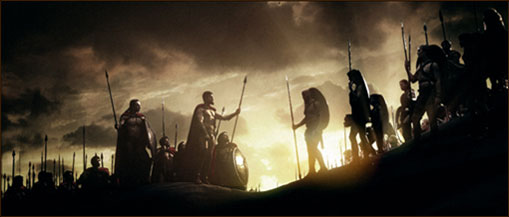skip to main |
skip to sidebar
Once skeptical, now I cannot wait to see it. Victor Davis Hanson has spoken.Again, purists must remember that 300 seeks to bring a comic book, not Herodotus, to the screen. Yet, despite the need to adhere to the conventions of Frank Miller’s graphics and plot — every bit as formalized as the protocols of classical Athenian drama or Japanese Kabuki theater — the main story from our ancient Greek historians is still there: Leonidas, against domestic opposition, insists on sending an immediate advance party northward on a suicide mission to rouse the Greeks and allow them time to unite a defense. Once at Thermopylae, he adopts the defenses to the narrow pass between high cliffs and the sea far below. The Greeks fight both en masse in the phalanx and at times range beyond as solo warriors. They are finally betrayed by Ephialtes, forcing Leonidas to dismiss his allies — and leaving his own 300 to the fate of dying under a sea of arrows.
But most importantly, 300 preserves the spirit of the Thermopylae story. The Spartans, quoting lines known from Herodotus and themes from the lyric poets, profess unswerving loyalty to a free Greece. They will never kow-tow to the Persians, preferring to die on their feet than live on their knees.
If critics think that 300 reduces and simplifies the meaning of Thermopylae into freedom versus tyranny, they should reread carefully ancient accounts and then blame Herodotus, Plutarch, and Diodorus — who long ago boasted that Greek freedom was on trial against Persian autocracy, free men in superior fashion dying for their liberty, their enslaved enemies being whipped to enslave others.
The trailer, here, I hope will more than make up to this French abomination. (no not the below, follow the link).










No comments:
Post a Comment